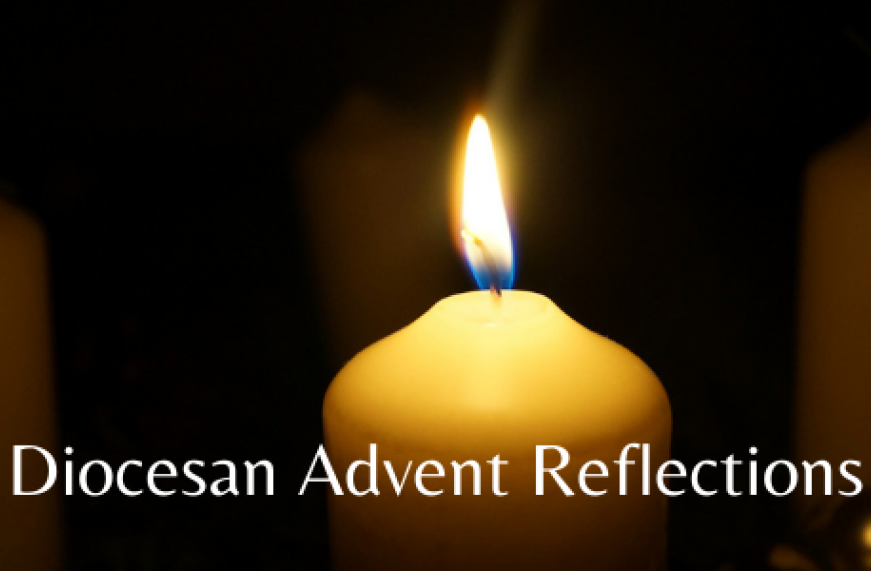Daily Advent Reflection: December 3

First Thursday of Advent
Psalms 18:1-20 · 18:21-50
Isa. 2:12-22
1 Thess. 3:1-13
Luke 20:27-40
Most of the time, I see the structure of the liturgical year and its various observances as a wonderful gift of our tradition. Waiting. Expectation. Preparation. Hope. These words are closely tied to our understanding of Advent, and they point to the joy, gratitude, and excitement that we feel during the Christmas season. The seasonal bustle of gifts, decorations, and gatherings, along with our anticipation of celebrating the birth of Jesus in community—we anticipate these things, and hold them in memory; they reflect the richness and love in our lives. But this year, familiar customs and simple nostalgia just won’t do.
I am writing this before the results of the 2020 election, and before the availability of a Covid-19 vaccine. In a few days Americans will know what the voters’ decisions have been, and start to discern a probable trajectory forward in our national life. I know what I’m hoping to see, and the suspense is killing me. And in the next several months, hopefully I’ll be rolling up my sleeve and getting a shot that will enable me to break my isolation and engage more fully with others, in person. But for the moment, I am stuck in worry, and located in Ordinary time, in a bad, sad, strange and difficult Ordinary time. How do we step across this threshold of the liturgical year into the beauty of Advent, when it might feel like we are standing in glue?
What has been some kind of a saving grace is the commitment of groups of people to continue to connect—online, by phone, or email, or card. At St. Dunstan’s All Saints service this year, I got choked up seeing the faces on Zoom, including visual tributes to those who are now in the communion of saints. I wasn’t alone in that—many messages were exchanged that weekend expressing how grateful we are for one another, and how much we care and are cared for.
Today’s passage from 1 Thessalonians 3:1-13 touches us with the emotions that are so similar to what many of us feel—especially Paul’s words in verses 9-12.
"How can we thank God enough for you in return for all the joy that we feel before our God because of you? Night and day we pray most earnestly that we may see you face to face and restore whatever is lacking in your faith. Now may our God and Father himself and our Lord Jesus direct our way to you. And may the Lord make you increase and abound in love for one another and for all, just as we abound in love for you."
Paul has been worried. He has decided to stay in Athens—this letter, among his others, reflects a time when he has left the fledgling communities to undergo his own challenges and persecutions, and leaving them to undergo theirs. He has built close relationships with them, he has taught and supported and delighted in what they have been able to build together. It is not an easy or secure time for any of them. What is touching is the affection and yearning Paul expresses. We can relate to Paul, our honored ancestor in faith—even though sometimes he’s curmudgeonly, judgy and harsh--because he cares so deeply about the community of faith moving forward, about who they were and what they would become. What a beautiful and hopeful thing to see such an outpouring of love from Paul! And in our times, we know that our emotions are very similar, and that we light up inside with happiness and gratitude to God when a well-loved face and voice we’re seeing and hearing at a distance assures us cheerfully, “I’m doing fine!”
The spiritual meaning of Advent includes anticipation, hope, gratitude, and a feeling of being open to blessing. This year will feel very different. We will see and hear one another over phones and screens. There will be illness, financial stress, frustrations and disappointments of all kinds. We will need to make an extra effort to be kind, to reach out, to find those in need of generosity. Maybe we will set ourselves, alone or with others, to consciously “vigil”, an ancient practice of reflective waiting that has much to offer us. We will step into the hopeful time, embracing this space in our liturgical year knowing that it has always been there to offer us a chance for deeper communion, and also knowing that the One for whom we wait is the inspiration and model for our real-time, real-life love and care for one another.
Gloria Alt
St. Dunstan’s Episcopal Church, Madison
